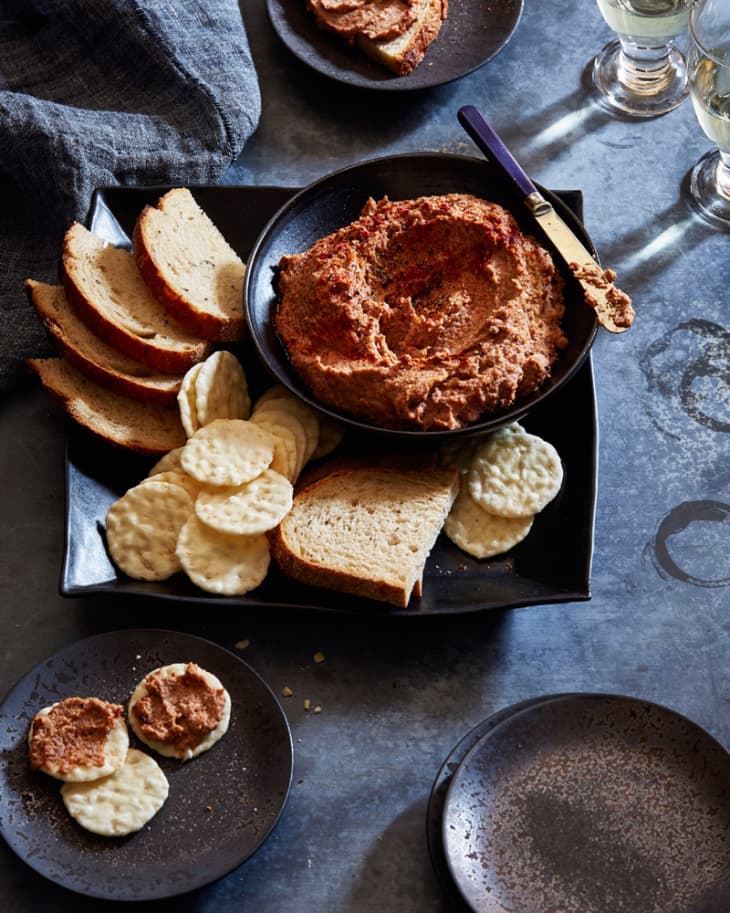Recipe: Vegetarian Chopped Liver with Shallots

Serves8 to 10

Chopped chicken liver (gehakte leber in Yiddish) was so iconic and central to the Eastern European Jewish diet that American Jews crafted a way to eat it with dairy as well as meat meals. The meatless version, known as either vegetarian chopped liver or mock chopped liver, rose to prominence in the scores of dairy restaurants that once slung blintzes, cheesecake, and borscht with sour cream on New York City’s Lower East Side.
According to Arthur Schwartz’s Jewish Home Cooking: Yiddish Recipes Revisited, mid-20th-century vegetarian “liver” recipes were made with canned peas or canned string beans mashed up, flavored with copious amounts of fried onions, and thickened with ground walnuts and Manischewitz Tam Tams crackers. The version at the most famous New York City kosher dairy restaurant, Ratner’s, used ground-up cooked lentils to reach a faux-meaty texture and taste, and contained a secret ingredient: a spoonful of peanut butter!
I prefer to start with hearty kidney beans and amp them up with several umami-packed additions like cremini mushrooms and sautéed shallots. A few hard-boiled eggs whirred into the food processor add richness to the creamy bean base. Serve the spread with crackers for dipping or layer it on challah or rye bread.
Vegetarian Chopped Liver with Shallots
Serves 8 to 10
Nutritional Info
Ingredients
- 3
large eggs
- 3 tablespoons
vegetable oil
- 12 ounces
shallots, thinly sliced into rings
Kosher salt
Freshly ground black pepper
- 8 ounces
cremini mushrooms, stemmed and chopped
- 1 tablespoon
packed light or dark brown sugar
- 1/4 cup
chopped walnuts
- 1
(15-ounce) can kidney beans, drained
- 2 tablespoons
mayonnaise
- 1 tablespoon
sweet paprika
- 1 teaspoon
onion powder
Instructions
Place the eggs in a small saucepan, cover with water by 2 inches, and bring to a boil, uncovered, over high heat. Remove from the heat, cover, and let sit for 18 minutes. Drain the eggs and rinse well under cold water to stop the cooking process. Peel the eggs, cut them into quarters, and set aside.
Meanwhile, heat the oil in a large frying pan over medium heat until shimmering. Add the shallots and a pinch of salt, cover, and cook until softened and lightly browned, about 10 minutes. Uncover, add the mushrooms and sugar, and continue to cook, stirring occasionally, until deeply browned and most of the mushrooms' liquid evaporates, about 10 minutes. Remove from the heat and set aside to cool slightly.
Place the eggs, shallot and mushroom mixture, walnuts, kidney beans, mayonnaise, paprika, onion powder, and a generous amount of salt and pepper in a food processor fitted with the blade attachment. Pulse until smooth, scraping down the sides of the processor bowl as needed.
Transfer to a medium bowl, cover, and refrigerate for at least 2 hours or overnight to let the flavors meld. Serve cold or at room temperature.
Recipe Notes
Storage: Store leftovers in an airtight container in the refrigerator for up to 3 days.
Reprinted with permission from Little Book of Jewish Appetizers by Leah Koenig, copyright (c) 2017. Published by Chronicle Books.